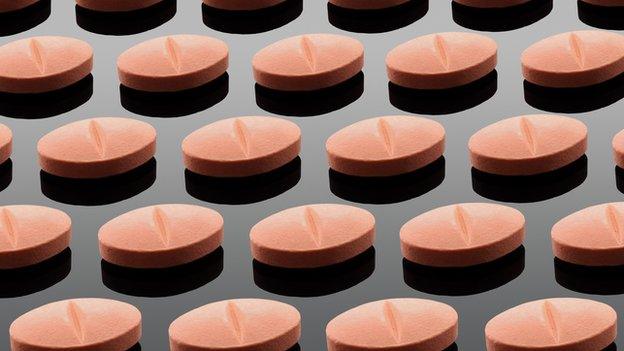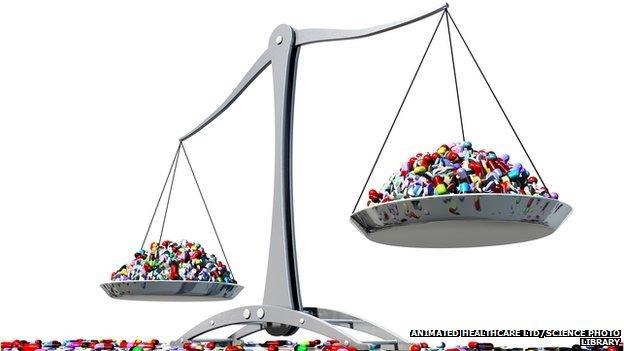Statin debate: A bitter pill to swallow?
- Published

Guidelines out for consultation this month are calling for millions more people to be put on cholesterol-lowering statin drugs. But some fear such a move would do more harm than good.
The National Institute for Health and Care Excellence says the scope for offering statin treatment should be widened to save more lives. The pills protect against heart attacks and strokes.
Opponents argue that for low-risk groups, the overall harm caused by taking statins would actually outweigh the benefits.

Being obese, having high cholesterol, diabetes or high blood pressure all increase your cardiovascular risk
Who's right?
Cardiovascular disease remains the leading UK killer. It claims about 180,000 lives a year.
Currently, doctors are meant to offer statin tablets to the estimated seven million people who have a one-in-five chance of developing cardiovascular disease over 10 years, based on risk factors such as their age and whether they smoke.
This includes people who have had a heart attack in the past. And experts agree that in high-risk populations, the benefits of statins clearly outweigh the risks.
NICE is now suggesting that people with as low as a one-in-10 risk should be offered statins.
This could include someone who is in their 40s and otherwise fit and healthy, but has high cholesterol, as well as practically anyone over the age of 65 since age is a big risk factor.
Some doctors say targeting these people is misguided and will ultimately do more harm than good.
Not for the healthy?
A recent survey of 500 GPs by the magazine Pulse revealed only half would personally take a statin or recommend them to a family member based on the new lower risk score.

The merits of statins for lower-risk individuals is hotly debated
Former GP and deputy chairman of the British Medical Association Dr Kailash Chand has first-hand experience of the side effects of statins.
"A few years ago I started taking statins knowing that it has all the benefits and after perhaps a few weeks I started having muscle aches, sleep disturbance."
He says much of the data that the new NICE recommendations are based on comes from pharmaceutical companies that make statins, which, arguably, have a vested interest in the drugs' success.
He says there is not enough evidence that wider use would be wise and that the benefits have been hyped up.
He is also concerned that it will give people false assurance that they are protected for life and can ignore other risk factors such as poor diet and smoking.
Then there are the side effects to consider.
Memory problems

Rarely, statins can cause jaundice
Common side effects, external, affecting between one in 10 and one in 100 people, include headache, nausea and insomnia.
For between one in 100 and one in 1,000 people they can cause inflammation of the liver, blurred vision and weakness.
Severe side effects such as memory problems, jaundice and damage to nerves and muscles are rare, affecting fewer than one in 1,000 people.
Each person will need to weigh these risks against any potential gains, and some may decide that it's not worth taking statins preventatively.
Lives saved

It is estimated that statins save 7,000 lives a year in the UK.
NICE says extending their use would save thousands more lives and, in the long run, would save the NHS money.
But it is estimated one in every 10,000 people who takes statins will experience a potentially dangerous side effect.
Experts calculate, external that to save one life, or avoid a non fatal heart attack or stroke, you would need to treat 11 high-risk patients for 10 years.
To save a life or avoid cardiovascular morbidity among low-risk patients the number you need to treat increases to 23.
But different studies have looked at different types of patients and have yielded different results, so it is difficult to know if this pans out.
US researchers estimate, external that for every 100 people without known heart disease who take statins for five years, 98 would see no benefit, and only one or two would avoid a heart attack that they might not have otherwise.
NICE guidelines are not compulsory, so even if the recommendations of treating low-risk people go ahead, some may not do this.
Prof Peter Weissberg of the British Heart Foundation says that ultimately it will be up to patients and their doctors to decide.
"Life-threatening side effects are thankfully extraordinarily rare. But troublesome side effects are relatively common, although that's true of any drug."
- Published12 February 2014
- Published12 February 2014